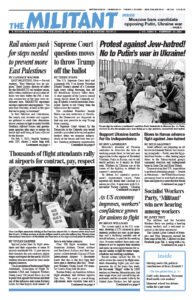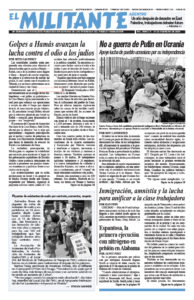EAST PALESTINE, Ohio — For rail workers, “East Palestine was no surprise,” Jared Cassity, director of safety for the SMART-TD rail workers union, told a video conference of rail union officers two days before the Feb. 3 one-year anniversary of the toxic train derailment here. SMART-TD represents railroad conductors and engineers. “The next East Palestine, at least at this pace that we’re going, is imminent.”
In East Palestine and Columbiana, the county seat, residents and supporters gathered to mark their determination to continue to fight to make Norfolk Southern railroad bosses and government agencies take steps to ensure the health and well-being of those affected by the disaster.
On Feb. 3, 2023, Norfolk Southern train 32N, almost 2 miles long with 150 cars, suffered a wheel axle failure and derailed, dumping 50 cars on the ground, including 11 carrying dangerous chemicals. A massive fire ensued, leading to evacuation of the downtown area. Three days later, Norfolk Southern officials pressured government authorities to allow them to drain five vinyl chloride tanker cars and burn off 115,000 gallons of the chemical.
This so-called controlled burn sent up a noxious cloud that rained toxic dust over miles, including into neighboring Pennsylvania. Chemical runoff in area streams killed thousands of fish and aquatic animals downhill from the crash. Dangerous chemicals were detected in the Ohio River, 16 miles away.
One day after the burn, the rail bosses had crews relay tracks on top of contaminated soil and ballast, and the company began running trains again. “These workers were provided with no protective equipment, they were exposed to these chemicals,” Tony Cardwell, president of the Brotherhood of Maintenance of Way, said in the video conference. “Some are still suffering from headaches from this. We are invested in the outcome for the people of East Palestine and for our members.”
Two days after the burn, authorities told residents it was safe to return to their homes. Many who did, or just came to check on them, reported health problems. Environmental Protection Agency employees who were doing house to house interviews fell ill as well.
Only after a public meeting where area residents excoriated Norfolk Southern bosses and government officials was the railroad forced to agree to rip up the newly laid tracks and remove the contaminated soil beneath. That took months.
“I don’t feel like hardly anything has changed in a year,” Zsuzsa Gyenes told the Militant. “My son and I are still living in a hotel. Homes aren’t being tested.”
Gyenes said she participated in several actions Feb. 3 this year. “There was a protest near the crash site with a big banner, ‘We don’t want to die.’ It was controversial. Not everyone wants to call more attention to the ongoing consequences of the disaster.” she said.
“I feel like we’ve been stonewalled, but the protest was kind of empowering,” she added. “Hopefully the events organized that day will help invigorate our fight.”
The White House announced that President Joseph Biden will visit East Palestine Feb. 16 — the first time he’s bowed to pressure to put in an appearance.
“I hope it’s not just a photo op,” Gyenes said. “I hope he’s finally coming to bring us more help.” Residents have long demanded Biden declare the East Palestine derailment a national disaster, which would open up federal funding. Ohio Gov. Mike DeWine requested the disaster declaration last July.
Workers control of rail operations
The Feb. 1 rail union video conference focused on the Rail Safety Act now stalled in Congress. Railroad bosses oppose the bill, especially its requirement for a two-person crew on all trains. Eddie Hall, president of the Brotherhood of Locomotive Engineers and Trainmen, explained the dangers of engineer-only long-distance hauls.
Andrew Sandberg, speaking for the International Association of Machinists, said that since profit-boosting Precision Scheduled Railroading was introduced on Class 1 railroads in 2017, there are now 3,000 less Machinists working on those railroads. To reduce operating costs, rail bosses have systematically slashed the number of conductors, engineers, track and maintenance workers, as well as locomotives. “And when they cut workers, the same day they force the workers who are left to work overtime,” Sandberg said. “This is dangerous.”
“The safety culture hasn’t changed,” said Brian DeLucia from the Transportation Workers Union Rail Division. “We represent car inspectors. We still have locations where the inspections they are doing on 3-mile-long trains is one person sitting in their truck watching it roll by. I hope that another East Palestine doesn’t happen, but unfortunately, I fear it will.”
The National Transportation Safety Board has announced new public hearings will be held in East Palestine in June, tasking with preparing a final report on the causes of the derailment. At NTSB hearings here last summer, rail union representatives spoke, exposing the dangers the profit-driven rail bosses’ moves have posed for both rail workers and people who live near the tracks.
Ved Dookhun, Socialist Workers Party candidate for U.S. Senate from Pennsylvania, joined the protests here Feb. 3. Dookhun is a freight railroad conductor and member of SMART.
“I salute the continuing resistance by working people in this area and their demand that Norfolk Southern and government agencies tell the truth and address the real health and welfare impact of the railroad’s complete disregard for the safety of rail workers and residents alike,” he said. “My party explains the low point of labor resistance is behind us, that working people are standing up and using their unions to fight attacks by the bosses and their government. The response by working people here is further proof of that.”
“Working people in East Palestine have shown that neither the railroad bosses nor the government and its various agencies act for our interests,” Dookhun said. “The rail unions have spoken out — including during the recent video conference — to make clear this disaster was inevitable.
“More laws and government regulations are no solution. It is rail workers and our unions that need to act now. We can fight for workers control of all rail operations — from crew size to schedules — to ensure safety on the job and in the community.
“We say railroad unions need to use union power, force the bosses to hire more workers, to maintain and inspect equipment and trackage. There should be a crew of four on every train, two on the locomotive and two in the rear, and trains no longer than 50 cars.”

